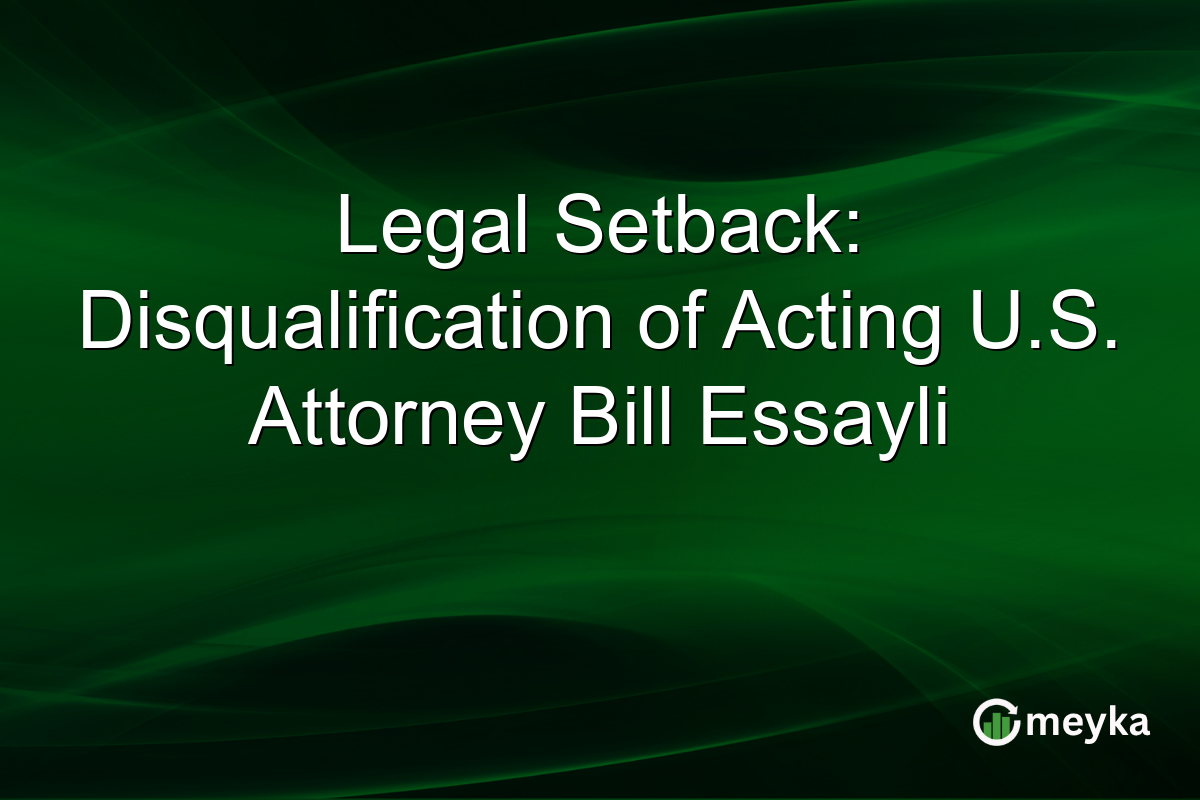Legal Setback: Disqualification of Acting U.S. Attorney Bill Essayli
Today, a federal judge disqualified acting U.S. Attorney Bill Essayli, citing violations of the Federal Vacancies Reform Act. This legal setback sheds light on persisting challenges within the Trump administration concerning the use of acting officials to circumvent Senate confirmation. The decision could impact ongoing federal prosecutions, marking a critical judicial pushback against these strategic appointments.
Background on the Federal Vacancies Reform Act
The Federal Vacancies Reform Act governs the temporary filling of vacancies in Senate-confirmed positions. This law ensures that qualified individuals undergo Senate scrutiny, maintaining a checks and balances system essential to federal appointments. Under the Trump administration, there has been increased reliance on acting officials, leveraging this mechanism to bypass lengthy confirmation processes.
This method allows swift appointments but draws criticism for undermining democratic oversight. The disqualification of Essayli brings these practices into focus, highlighting concerns about legal legitimacy and accountability.
For more context on this growing controversy, you can follow discussions on social media around the topic here.
Implications of Essayli’s Disqualification
The judge’s decision to disqualify Bill Essayli presents significant ramifications for forthcoming federal prosecutions. As acting U.S. Attorney, Essayli’s authority to prosecute cases has been questioned, throwing several high-profile cases into uncertainty.
This ruling illustrates the judiciary’s willingness to challenge administrative practices perceived as circumventing the law. Legal experts argue this could prompt a reevaluation of past cases managed under improper authority, affecting public trust in legal proceedings.
The Trump administration’s strategy faces increased scrutiny, with legal analysts suggesting potential reverberations across other federal agencies employing similar appointment strategies.
Challenges Facing the Trump Administration
The Trump administration’s use of acting officials has sparked widespread debate over the legality and ethics of its strategies. Critics argue this practice erodes institutional integrity by sidelining the Senate’s role.
This strategy comes under fire, especially in light of Essayli’s disqualification. It signals judicial intolerance for perceived abuse of the Federal Vacancies Reform Act, raising questions about similar positions elsewhere. As legal challenges mount, the administration’s approach is increasingly deemed unsustainable under current laws, prompting calls for reform.
Final Thoughts
The disqualification of Bill Essayli underscores a pivotal moment in examining the Trump administration’s handling of federal appointments. It highlights the importance of adhering to established legal frameworks like the Federal Vacancies Reform Act. As judicial challenges continue, the administration may face increasing difficulties maintaining its preferred staffing strategies without legislative change. Moving forward, this ruling could serve as a catalyst for more rigorous enforcement of appointment laws, reinforcing the necessity of Senate confirmation to uphold democratic processes.
FAQs
The Federal Vacancies Reform Act is a law that dictates how temporary fills are made for Senate-confirmed positions. It is meant to maintain congressional oversight by requiring Senate approval for significant appointments, ensuring qualified individuals hold crucial government positions.
Bill Essayli was disqualified because his appointment violated the Federal Vacancies Reform Act. The judge ruled that his role exceeded the duration and conditions allowed for acting positions without Senate confirmation, questioning the legality of his authority.
The decision challenges the Trump administration’s reliance on acting appointments to bypass Senate confirmation. It casts doubt on the legitimacy of similar appointments, possibly affecting other areas where acting officials hold significant roles.
Current prosecutions overseen by Essayli may face legal challenges due to questions about his authority. This could lead to delays or retrials, impacting the integrity of ongoing cases and public trust in the justice system.
Yes, this ruling could prompt a reevaluation of how acting appointments are used across federal agencies, urging stricter adherence to the Federal Vacancies Reform Act and consideration of reforms to ensure compliance.
Disclaimer:
The content shared by Meyka AI PTY LTD is solely for research and informational purposes. Meyka is not a financial advisory service, and the information provided should not be considered investment or trading advice.






